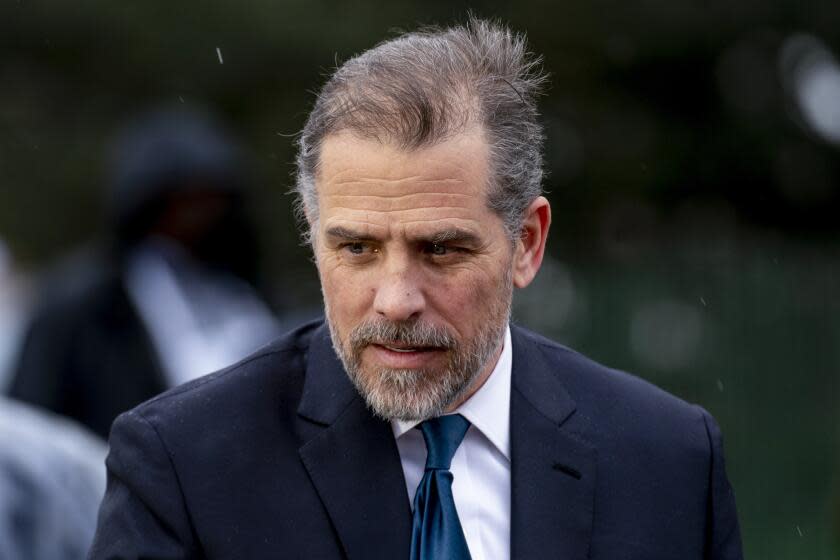Federal judge rejects Hunter Biden's bid to dismiss tax case in L.A., paving way for trial

A federal judge rejected Hunter Biden's bid to dismiss multiple counts of tax-related offenses in an 82-page ruling handed down Monday, clearing the way for the president's son to face court proceedings during the contentious 2024 election cycle.
U.S. District Judge Mark C. Scarsi, an appointee of then-President Trump, appeared skeptical of the claims of outrageous government misconduct and vindictive prosecution made by Biden's legal team during a hearing in downtown Los Angeles last week. In his Monday night ruling, he rejected all eight of Biden's attempts to have the case thrown out.
Biden, 54, was indicted on nine tax-related offenses in December, including allegations that he failed to pay taxes on time on more than $7 million in income from 2016 to 2019 and filed false returns. In 2018, prosecutors allege, Biden misclassified several personal expenses as business related, including $30,000 for his daughter’s tuition and $11,500 given to an escort, according to the indictment.
Biden paid off his debts, with penalties and interest, in 2021. But a deal to resolve some of those tax-related crimes and a firearms offense in Delaware fell apart last year after a judge raised questions about the nature of the agreement.
Last week, Biden's legal team argued that intense political pressure from Trump and Republicans dead set on hurting President Biden's reelection bid led to the collapse of the deal. That cleared the way for the convening of a grand jury in California by special counsel David Weiss, the U.S. attorney for Delaware who first began investigating the younger Biden in 2019.
Led by Abbe Lowell, attorneys for the president's son argued the case should be dismissed on a wide array of grounds, contending that Weiss' appointment was not legal, that the case was brought only due to outside political pressure, and that two of the Internal Revenue Service agents at the center of the investigation had violated Biden's rights by publicly disclosing some of his tax records. Lowell also argued that the plea deal Biden entered into last year was binding and gave him immunity.
Scarsi waved away Lowell's arguments about immunity, noting the agreement was not valid as it was never signed by a federal probation officer in Delaware. On the arguments related to Trump and Republican pressure, Scarsi said Biden "filed his motion without any evidence."
"The motion is remarkable in that it fails to include a single declaration, exhibit, or request for judicial notice," the judge wrote. "Instead, Defendant cites portions of various Internet news sources, social media posts, and legal blogs. These citations, however, are not evidence.”
Prosecutors last week also said Biden’s argument was a “conspiracy theory” that ignores a clear fact: Trump is no longer president, and Biden’s father oversees the Justice Department that is now prosecuting him.
“We strongly disagree with the Court’s decision and will continue to vigorously pursue Mr. Biden’s challenges to the abnormal way the Special Counsel handled this investigation and charged this case," Lowell said in a statement Monday night.
Lowell also argued that IRS agents Gary Shapley and Joseph Ziegler trampled Biden’s due process rights by giving rounds of news interviews on the case and releasing confidential tax documents to the public. But Scarsi said Lowell failed to draw a line between their conduct and the charges in Los Angeles.
“Defendant does not accuse Shapley and Ziegler of misconduct in the process of building the case against him or any active collaboration between them and the prosecution; instead, he posits that their public disclosures of information about the investigation might have impacted the Special Counsel’s decision to pursue the tax charges," Scarsi wrote. "Defendant offers no facts to suggest that the information Shapley and Ziegler shared publicly had any prejudicial effect on the grand jury’s decision to return an indictment."
Biden is tentatively scheduled to stand trial on June 20, potentially adding to the list of court dates infringing on the 2024 election cycle. Trump is facing four separate prosecutions in multiple jurisdictions for allegedly falsifying business records, failing to return classified documents to the White House and attempting to interfere with the results of the 2020 election that he has repeatedly claimed was rigged, without providing evidence.
It remains unclear whether any of those cases will reach a jury before voters cast ballots later this year.
Times staff writer Matt Hamilton contributed to this report.
This story originally appeared in Los Angeles Times.


